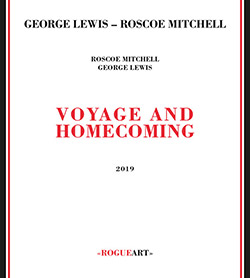
It's problematic but it might be possible to argue that the two AACM members most consistently committed to experimentation over the five plus decades of its existence have been Roscoe Mitchell and George Lewis. Problematic because what the term "experimentation" implies is such within the context of Western art music, by no means the sole aesthetic ground for pushing limits, attempting to establish new formal structures, etc. But both Mitchell and Lewis have worked a great deal with musicians operating out of post-Cage strategies, sometimes successfully, sometimes, in this listener's opinion, uncomfortably, as though forcing their music into strictures that don't always serve them well.
The music heard in this recording is from a concert in Berlin, given on February 2, 2018, some 47 years since the pair first met. There are three works. 'Quanta' is a lengthy dialogue between Lewis on laptop and Mitchell on sopranino saxophone. The latter rarely takes any prisoners when wielding this particular axe, venturing into the raw, ultra-high territory afforded by its dimensions. Lewis had, since the early 80s, associated with IRCAM, the Paris-based electronic music studio and, to an extent, the sounds he develops from his computer have something of the (over) synthesized character typical of that organization, a kind of scrubbed clean, metallic aspect. That said, it's often a fine complement for Mitchell's grainier attack, his spittle counteracting any smoothness, the harsh reed sounds bouncing between globular tones. Midway through, Lewis disrupts things, sending his laptop into more skittery, pricklier territory. Mitchell vaults into the circular breathing torrents he's practiced since at least 'The Flow of Things' (Black Saint, 1987), over intriguingly dreamy electronics (possibly sampling some syrupy strings) — very effective — before Lewis brings things to an amusing conclusion, getting his laptop to attest, in a female voice, "unable to continue", over and over.
Lewis' Voyager program has been used to trigger acoustic instruments and for this work, it's a piano. The second piece, accurately titled, 'Voyager', begins with only a piano thus activated. It plays — I've no idea on the input — in a manner a few steps from Cecil Taylor, somewhat more romantic, maybe closer to some figuration of a smoother, more supple than usual Muhal Richard Abrams. In and of itself, it's fascinating to listen to, to try to imagine what kind of algorithms went into the programming, how choices are made. The piano plays solo, as it were, for some seven minutes before Lewis enters with some jaunty trombone, the program clearly listening to him, and he to it. Sometimes it seems imitative, sometimes veering off on its own to chart out new possibilities. When Mitchell joins in on alto a few minutes later, Voyager shifts to a rapid-fire attack recalling Conlon Nancarrow but also evincing some impressive dynamic shifts and pauses. The pair soon engage in a very satisfying and quiet, almost balladic sequence. The 25-minute track is perhaps a bit less cohesive than 'Quanta' but certainly opens up prime territories for future investigation.
The final piece, 'Homecoming', is an acoustic duo, Lewis generating his patented, exuberant sputtering before turning to hyper-low burbles, to which Mitchell, on soprano, responds with gasped wheezes. It's a rough and tumble, engaging and joyous dialogue, an aural equivalent of two friends wrestling around on the ground, getting plenty dusty, and a fine way to end the evening.
This particular exploration was, to these ears, quite successful, one of the strongest uses of Lewis' system I've heard. Looking forward to more. [Annoying label decision gripe: Why append a separate, 90-second track of applause at the end?]
Comments and Feedback:



More Recent Reviews, Articles, and Interviews @ The Squid's Ear...


|

